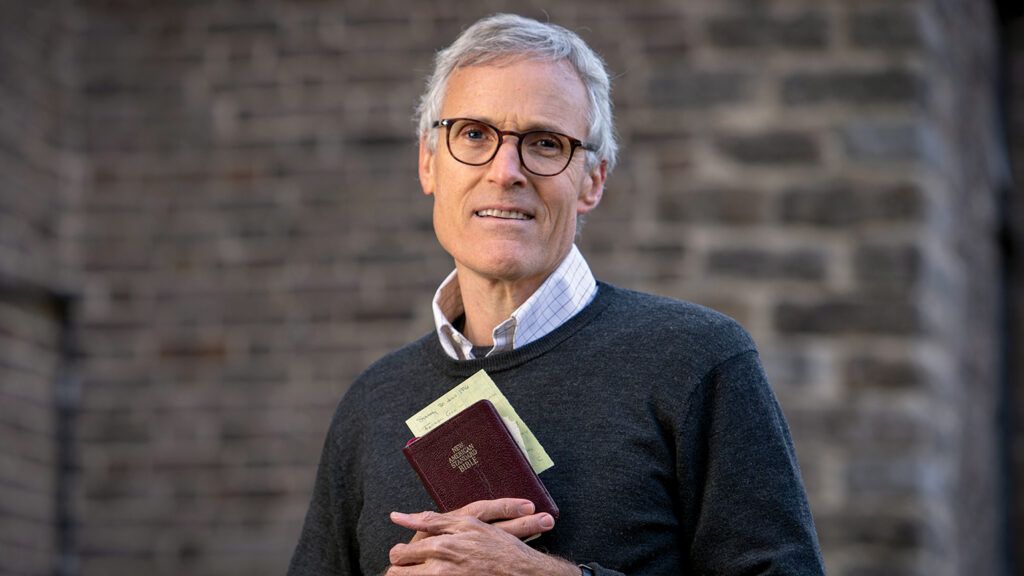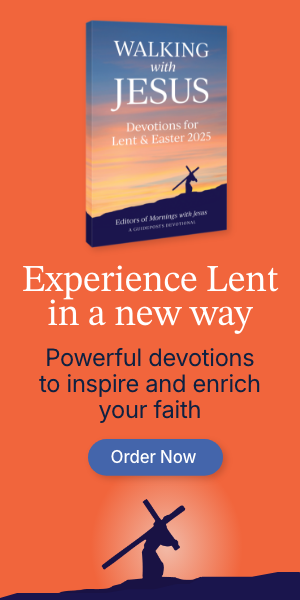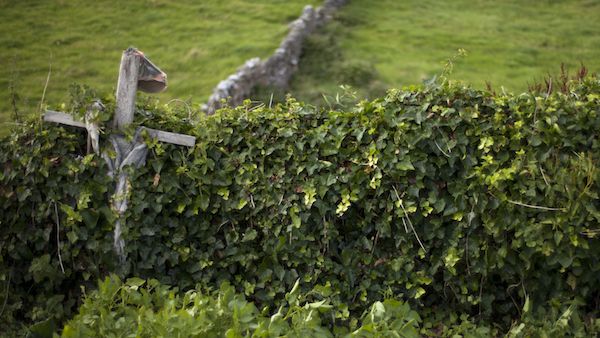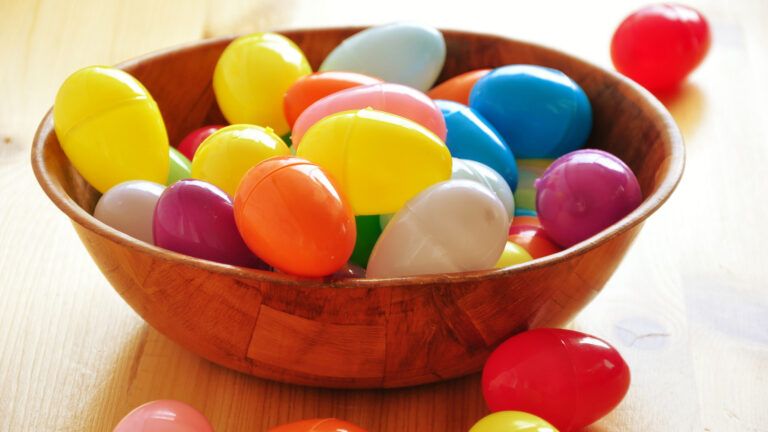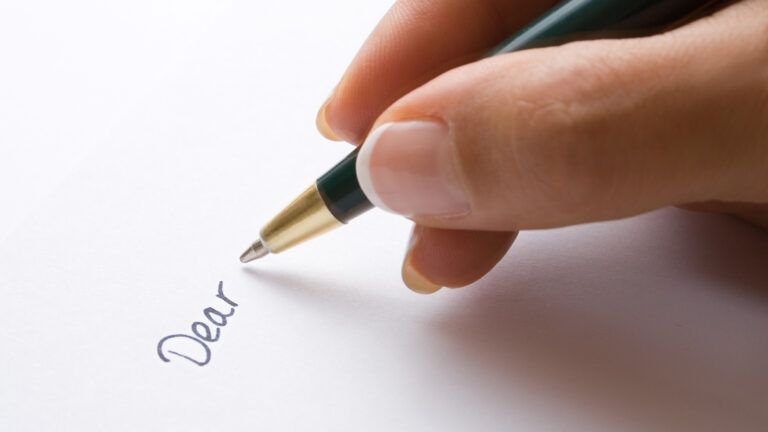We were cleaning out Mom’s house in Pasadena in the weeks after her death. Dad had died nine years earlier, so I pretty much figured I had gone through the grieving process, understanding who he had been and accepting the loss.
Then I discovered a Bible on a bookshelf. Not one that Mom ever used, not particularly dog-eared either. Just a book on a shelf, one of many. Everybody had claimed their favorites, and my three siblings and I were packing up the rest to give to the library for their annual fundraiser. None of us really needed another Bible.
Before putting it in the giveaway box, I dusted it off, flipping idly through the unmarked pages. It was a newish edition, published in the 1990s, a fine leather cover. Not signed. No Ex Libris bookplate. Not anyone’s beloved copy.
Then out slipped a scrap of yellow lined paper with writing on it. I recognized the handwriting immediately. Dad’s. Everything in uppercase letters, the sort of thing I knew so well from the clippings he would often send with a Post-it note: “Thought you’d enjoy this” or “Reminded me of you” or “Got a chuckle out of this” and almost always ending with his frequent refrain to all four of us kids: “I’m proud of you! Love ya.”
Dad was proud of us. Nice to remember that right now. I wondered if this note were some other upbeat message. But, no, the words were addressed to the divine. “Father God,” it began. “As you know, I rejoice in wife, children, grandchildren, close friends, colleagues, companions and the warm love of Jesus….”
I smiled. Sounded like one of Dad’s rambling graces at dinnertime, a rehash of news he’d picked up on the radio on his commute home, maybe a petition or two for us, an exam coming up or a piano recital or drill team tryouts, always concluding with mention of Mom’s meatloaf or mac and cheese (getting cold while we waited): “Bless this food to our use and the hands that prepared it.” There was so much info in his graces that one family friend dubbed them the Six O’Clock News.
But this prayer went on at a much deeper, more personal level. And it broke my heart.
“Why do I suffer from lack of self-confidence?” Dad had written. “Why do I see the negatives and shortcomings in my everyday life? Why call up shortcomings when I have so much confidence in those I love and rejoice about!!” Double exclamation point. Why, indeed?
I looked at the date scrawled at the top of the page. He’d written these words when he was in his early seventies, after an impressive career. He’d been a professional fundraiser, dedicated to causes he cared about. He’d volunteered for the Pasadena Tournament of Roses, becoming president and leading the Rose Parade in 1983 (with all of us in tow).
When the Olympics came to Los Angeles the next year, he ran the sailing venue, having been an award-winning yachtsman himself. Lacking confidence? It didn’t make any sense.
Then I thought about his drinking in the evenings and how impatient it made me. The glass of scotch or vodka before dinner that seemed to be on constant refill the rest of the night, long after Mom had gone to bed. He’d call me in to watch a basketball game on TV and then unload about a conflict at work or a colleague he was afraid he’d disappointed or someone who’d inadvertently hurt his feelings. “Don’t be so sensitive,” I wanted to say, the sort of thing that Mom would say to me.
Sensitive, like me. Did that have to be so bad? Was that the reason for all his self-medicating? Dad never drank during the day, only at night, at home. An alcoholic, I’d come to realize. Highly functional but one nevertheless. Putting that down, even now, feels like a terrible transgression. It’s not as if we kids hadn’t discussed it, dealing as we had with one beloved in-law’s struggle with addiction and how she found help in Alcoholics Anonymous. Somehow, though, Dad could never bring himself to do that, even as he revealed here—with heartbreaking honesty— his crippling vulnerability.
I looked up at old family photos still on the walls and shelves, mementos from his childhood. There was that sweet picture of his mother and siblings—what a wonderful grandmother she was—and those shots of the submarine he’d served on during World War II.
That was it, I tried to tell myself. Being a 19-year-old kid on a submarine somewhere in the Pacific, depth charges exploding in the dark waters around you while you desperately tried to escape the Japanese convoy you’d just attacked. At any moment, the sea could come crashing in on you. Circumstances like that would have been traumatic, wouldn’t they?
The one time—on a family trip to Pearl Harbor—that I’d stepped onto a submarine like the one he’d served on, I found it horribly claustrophobic. And I was on board for only a few minutes, not the many months Dad had been.
I wanted to find some primal trauma to blame this insecurity on. Could it have been those teenage years when his mother had almost died of breast cancer? That torturous summer when he was farmed out to friends at the beach, not knowing how his mother would come through surgery at a time when the word cancer was rarely spoken, just whispered?
Yes, that could have exacted a lifelong emotional toll, but I kept circling back to his hand around that glass of scotch or vodka. And his inner pain.
Dad’s letter, Dad’s prayer, said something that was at the heart of his personality. He struggled every day. Whenever we got upset about something, Mom would say, “Just let your feelings go and move on.” She did. But Dad battled his feelings.
It never stopped him from being a good husband, a devoted father, a loyal colleague, a man of faith. In fact, maybe that very vulnerability gave him the power to be the person he was, rooting for the underdog. Asking God, as he wrote here at the end, “Get rid of the baggage. Do it now!”
Then he signed it, “Love ya.” Just as he’d always say to us.
I imagined him reading this Bible one morning, writing down that prayer. Then getting up and living his life. Cutting out an article to send to me, calling a friend, going to a meeting at church, writing a letter of thanks (he wrote wonderful thank-you notes), reading a report for a charitable organization he supported, buying a birthday present for one of us kids or the grandkids. My heart broke again.
I looked at the yellow slip of paper and thought of a prayer I needed to say myself. One asking forgiveness and understanding. No, Dad wasn’t perfect. Far from it. And there really isn’t any such thing as a functioning alcoholic, no matter what the externals are. Inside they battle their anguish over and over and try to douse that inner fire with drink. Yet I was sure now that his love for us and our love for him were the great joys of his life, his earthly salvation, allowing him to transcend his pain.
Toward the end of his life, the drinking stopped, a medical necessity. I was sorry for him and all of us that he was never able to confront it directly. What he could do, though, was call on God’s mercy. “I’m sorry, Jesus,” I said to myself, “that we were never able to help him more.” At the same time, I knew that a parent never wanted to burden his children, especially our dad. He kept it to the Six O’Clock News.
Then I slipped the prayer back in the Bible and put the book in the box of things we’d take home.
Dad was always honest in his prayers, the ones he shared and now this one tucked in a forgotten Bible. I was grateful for it. And to him. I wanted to reach out and give him a hug. “Thanks for those late-night confessions, Dad,” I’d say. “God is love and loves you just as you are.”
Then I’d add, “I’m proud of you. Love ya.”
For more inspiring stories, subscribe to Guideposts magazine.
